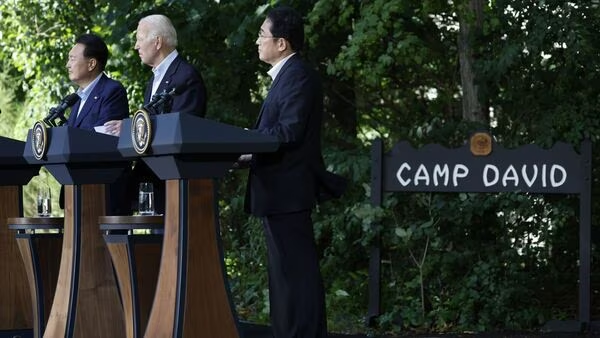Summit Highlights: US, Japan, South Korea Unite Against China's Indo-Pacific Actions
In a significant diplomatic move, the United States, Japan, and South Korea recently joined forces to denounce China's escalating and aggressive behavior in the Indo-Pacific region. The tripartite summit, marked by a display of unity and shared concerns, yielded key takeaways that shed light on the evolving dynamics in the region.
Unified Condemnation of Aggression: The central message of the summit was the unequivocal denouncement of China's actions in the Indo-Pacific. The participating nations expressed their collective concerns over China's assertive territorial claims, maritime expansion, and its impact on regional stability. The alignment of these three influential nations sends a clear signal that such actions will not be tolerated.
Strengthening Security Cooperation: Beyond words, the summit laid the groundwork for bolstering security cooperation among the three nations. Discussions revolved around potential joint military exercises, intelligence sharing, and technological collaboration to maintain a secure and stable Indo-Pacific region. This marks a strategic response to China's increasing military presence and activities in disputed waters.
Promotion of a Rules-Based Order: The summit emphasized the importance of upholding a rules-based international order. By condemning unilateral actions that challenge established norms and international law, the three nations advocated for peaceful dispute resolution and adherence to international regulations. This stance counters China's tendency to flout norms and pursue its interests through unilateral actions.
Economic Partnerships and Trade: Amid geopolitical tensions, the summit also highlighted the significance of economic partnerships. The three nations discussed the potential to strengthen trade ties, promote investment, and foster economic growth in the Indo-Pacific. This economic collaboration serves as a counterbalance to China's expanding influence in the region through its ambitious Belt and Road Initiative.
Engagement with ASEAN and Regional Partners: The summit acknowledged the importance of engaging with regional partners, particularly the Association of Southeast Asian Nations (ASEAN). A united approach involving regional countries is crucial to address shared concerns and challenges stemming from China's actions. This engagement seeks to create a broader network of support for a stable and peaceful Indo-Pacific.
Multilateral Diplomacy and Soft Power: While the summit highlighted a firm stance against China's aggressive actions, it also underscored the importance of multilateral diplomacy and soft power. Collaboration on issues like climate change, pandemic response, and humanitarian aid showcases the commitment of the three nations to addressing global challenges collectively.
In conclusion, the tripartite summit involving the United States, Japan, and South Korea represents a significant step toward countering China's dangerous and aggressive behavior in the Indo-Pacific. The unity demonstrated in this forum highlights shared concerns, and the outlined takeaways emphasize the importance of upholding international norms, promoting security, and fostering economic growth in the region. As the geopolitical landscape continues to evolve, this united front sets a precedent for diplomatic efforts aimed at ensuring a stable and prosperous Indo-Pacific.

.png)
Comments
Post a Comment